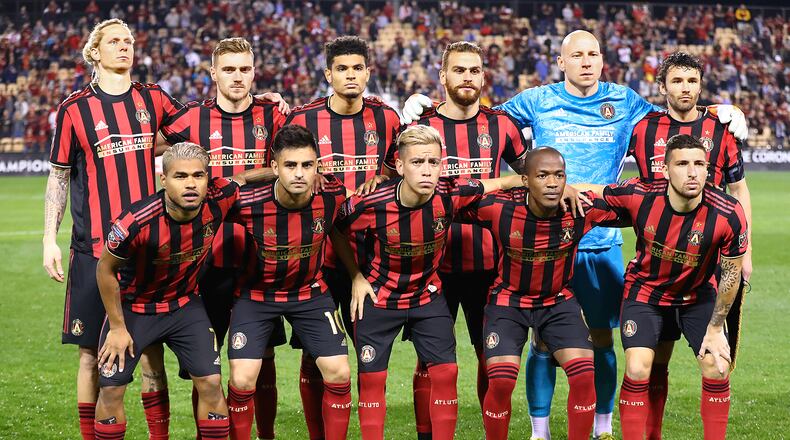Two years in, the world views Atlanta United differently. This is no longer the ambitious expansion team with the famous owner and the shiny new stadium. This is the MLS Cup holder, the club with lots of big-name players and scads of rabid fans. Two years in, this is the team to emulate. It’s also the team to beat.
It was no great shock that, in its first competitive match since hoisting the MLS Cup, Atlanta United was bested 3-1 by a team from Costa Rica. To twist the timeless phrase of Spider-Man’s Uncle Ben: With great soccer achievement comes greater – and more exotic – challenges. Barely 10 weeks after its triumphant night in Mercedes-Benz Stadium, it was losing in an 8,700-seat stadium not far from the Panama Canal. When you’re the MLS champ, you’re required to play in the CONCACAF Champions League, which can be as much a burden as a privilege.
The upshot was that, even before February was done, the newly minted champs faced an elimination game on a borrowed pitch. (Mercedes-Benz Stadium was booked for Supercross, requiring Thursday’s second leg to be staged at Kennesaw State.) Established soccer giants are accustomed to juggling competitions – Manchester City closed February by playing four games in 12 days, all four in a different league/event – but this is all new for ATLUTD.
To its credit, United beat Herediano 4-0 Thursday, advancing to the Champions League quarterfinals 5-3 on aggregate. This means they’ll play at least two more pressurized games outside the confines of MLS. Next up: a home-and-home against Monterrey of Liga MX.
Asked if the difference in his team’s increased workload will require acclimatization, United coach Frank de Boer said: “A hundred percent, sure. If you play normally every week, every six or seven days, you have the preparation for those matches. Now it’s only recovering and starting to prepare for the next game. It’s every three, four days you have a game. That’s really different, and they have to get in their minds that they really have to take care of themselves, have to recover, take a massage and rest very well to be ready for the next game.”
Then: “That’s a different approach that maybe a lot of players aren’t used to, but they have to experience that. You have to feel it. Hopefully we can adapt pretty quick because we need it, also because of the travel. That’s of course different from in Europe. Normally (European clubs) have a two-hour flight, a one-hour flight. Now you have sometimes a six- or five-hour flight. That’s a huge difference. I think a lot of players are used to travel, but maybe not every three days.”
Also different: Atlanta United has something to defend, which has proved difficult in the MLS. Only three times in the league’s first 22 years did the holders retain the MLS Cup, the most recent repeat coming in 2012. In a sport where scoring the first goal carries outsize weight, the margin between winning and losing is especially fine, and it can become even finer when some teams are being asked to play more often than others.
Here’s what United has ahead of it – the 34-game MLS regular season, which commences Sunday in Washington D.C.; the midseason Lamar Hunt U.S. Open Cup, which is a separate knockout tournament, and the ongoing CONCACAF Champions League, which could see them play three more two-leg ties, as such home-and-homes are known in soccer. And every time ATLUTD lines up, it will face an opponent looking to take down the reigning champs of U.S. soccer.
The MLS isn’t like Italy’s Serie A, where Juventus has prevailed seven seasons running, or the German Bundesliga, where Bayern Munich has finished first six times in succession. Two years ago, Toronto FC was clearly the class of the league, winning both the Supporters’ Shield and the MLS Cup. Last year it finished ninth in the 11-team Eastern Conference.
Said United goalkeeper Brad Guzan: “Whenever you have a new season, there’s no guarantee it’s going to be as good as last year, or potentially, if last year was bad, be as bad as last year. A new season is just that. Everyone starts from scratch.”
Atlanta United might still have the league’s best roster, but it did lose Miguel Almiron, who at worst was the league’s second-best player, to Newcastle of the English Premier League. As a replacement, United signed Gonzalo Martinez, who’s known as Pity, away from Argentina’s famed River Plate. ATLUTD also saw Tata Martino, its charter coach, leave to take charge of the Mexican national team. If you were listing the three biggest reasons United rocketed from expansioneer to champ, two of them are gone. (The third, MLS MVP Josef Martinez, remains.)
This isn’t to say Atlanta United can’t handle more games and more scrutiny. This has been a high-profile club from the first minute of its opening night in Bobby Dodd Stadium two Marches ago, and it has absolutely walked the walk. We’re about to see if Atlanta’s new favorite team can move from strength to strength. We’re about to see if this club, having stepped onto the global stage, can hold the spotlight.
About the Author
The Latest
Featured



